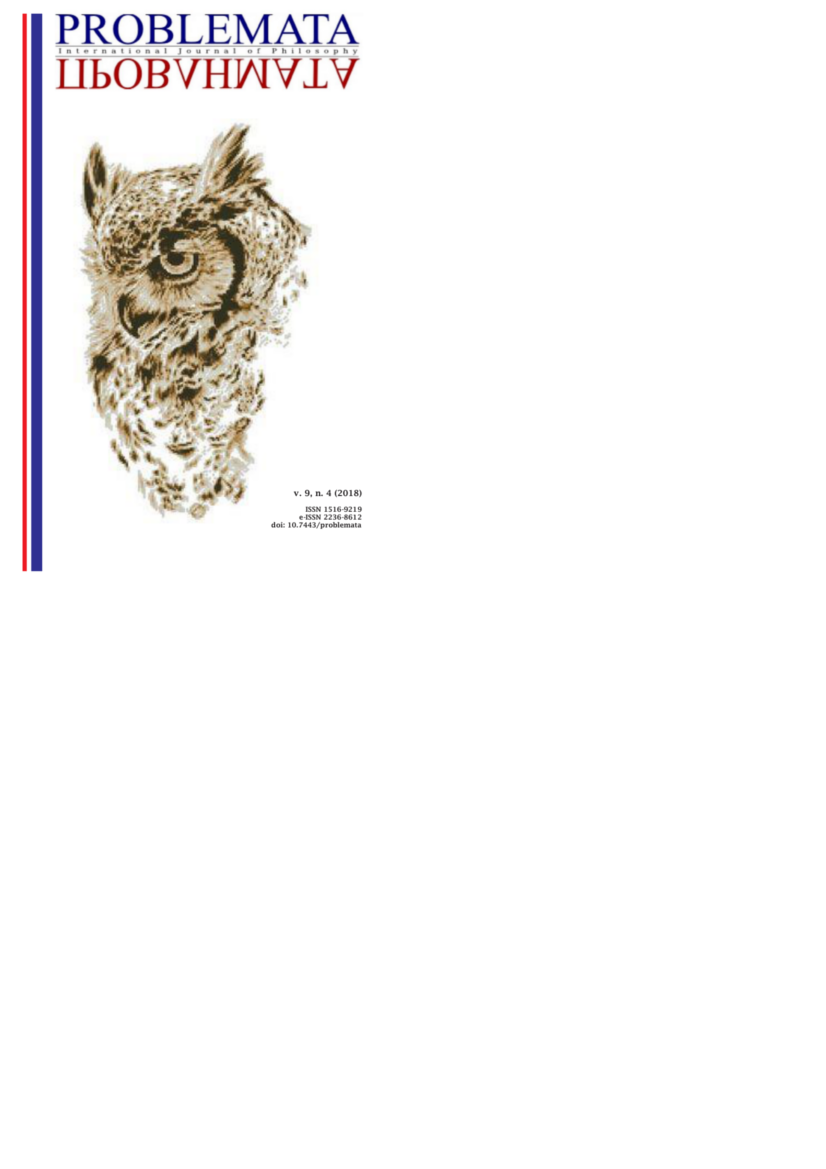HOBBES, PITKIN AND POLITICAL REPRESENTATION
DOI:
https://doi.org/10.7443/problemata.v9i4.40661Keywords:
Actions, representation, identity, contract, actors, convention.Abstract
The present article intends to examine the argumentative tension present in Chapter XVI of Leviathan, especially as regards the theatrical scene political composed of certain theoretical elements, such as the staff natural and artificial assignments of actions and words, on the one hand, and political authority, on the other hand. It is evident that the proper contextualization of these theoretical elements is essential to determine if the assumptions of the construction of an identity between the will and the actions of the actor and the author in the context of the constitution of the person civil public. This identity shows, in turn, that the theory of political representation developed in Leviathan, argues from a correlational identification between the one who authorizes an action and, respectively, the one who is authorized to act on behalf of another.Downloads
References
COPP, David. Hobbes on artificial persons and collective actions. The Philosophical Review, 89 (4), pp. 579-606, 1980.
DUMOUCHEL, Paul. Persona: Reason and Representation in Hobbes's Political Philosophy. SubStance, 25 (2), pp. 68-80, 1996.
JAUME, Lucien. Hobbes et l’État représentatif moderne, Paris: Presses Universitaires de France, 1986.
______. Le Vocabulaire de la Représentation Politique, in: ZARKA Y. C. (org.). Hobbes et son vocabulaire, Paris: Vrin, 1992.
DERRIDA, Jacques, Sending: On Representation, Social Research, 49.2 (1982), pp. 294-326 (p. 298).
GILL, Christopher. Personhood and Personality: The four-Personae Theory in Cicero, De Officiis”. Oxford Studies in Ancient Philosophy, Vol. 6. Oxford: Oxford University Press, pp. 169-199, 1988.
HOBBES, Thomas. Leviathan, or The Matter, Forme and Power of a Commonwealth Ecclesiasticall and Civil. Ed. C. B. Macpherson. Harmondsworth: Penguin Books, 1968.
______. Elementorum philosophiae sectio secunda De homine. London, 1658.
______. Leviathan, sive De materia, forma, & potestate civitatis ecclesiasticae et civilis. London,1668.
______.Elementos da Lei Natural e Política. Trad. Bruno Simões e Rev. Aníbal Mari. São Paulo: WMF Martins Fontes, 2010.
______.Do cidadão. Elementos Filosóficos a Respeito do cidadão. Tradução de Renato Janine Ribeiro. São Paulo: Martins Fontes, 2002
HAMPTON, Jean. The Intrinsic Worth of Persons: Contractarianism in Moral and Political Philosophy. Cambridge: Cambridge University Press, 2007.
HILL, Christopher. Covenant Theology and the Concept of ‘A Public Person’”. In: Power, Possessions, and Freedom: Essays in Honour of C.B. Macpherson. Ed. Alkis Kontos. Toronto: University of Toronto Press, pp. 3-22, 1979.
KROM, M., The Limits of Reason in Hobbes's Commonwealth, New York: Continuum Press, 2011.
MORTON, Adam. Why there is no Concept of a Person. In: The Person and the Human Mind: Issues in Ancient and Modern Philosophy. Ed. Christopher Gill. Oxford: Oxford University Press, pp. 39-60, 2001.
OSTRENSKY, Eunice. Soberania e representação: Hobbes, Parlamentaristas e Levellers. Lua Nova, São Paulo, 80: 151-179, 2010
PITKIN, Hanna. The Concept of Representation. Londres: University of California Press, 1967.
POLIN, Raymond. Politique et philosophie politique chez Hobbes, Paris: P.U.F., 1953.
RUNCIMAN, David. Pluralism and the Personality of the State. Cambridge: Cambridge University Press, 1997.
______. What Kind of Person is Hobbes's State? A Reply to Skinner. The Journal of Political Philosophy, 8 (2), pp. 268-278, 2000.
______. Hobbes’s theory of representation: anti-democratic or proto-democratic? In: Political Representation. Ed. Ian Shapiro, et al. Cambridge: Cambridge University Press, pp. 15-34, 2009.
RORTY OKSENBERG, Amélie. 2001. “Persons and Personae”. In: The Person and the Human Mind : Issues in Ancient and Modern Philosophy. Ed. Christopher Gill. Oxford: Oxford University Press, pp. 21-38.
SKINNER, Quentin. Hobbes and the Purely Artificial Person of the State”, in: Visions of Politics: Hobbes and the Civil Science, Cambridge: Cambridge University Press, 1999.
______. Hobbes on Representation, European Journal of Philosophy, 13 (2): 155–184, 2005.
______. Hobbes on Persons, Authors and Representatives. In: The Cambridge Companion to Hobbes’s Leviathan. Ed. Patricia Springborg. Cambridge: Cambridge University Press, pp. 157-180, 2007.
TUKIAINEN, Arto. The Commonwealth as a Person in Hobbes's Leviathan. Hobbes Studies, 7 (1), pp. 44-55, 1994.
THORBURN, W. M. “What is a Person?”. Mind, 26 (103), pp. 291-316, 1917.
TRICAUD, François. 1982. “An Investigation Concerning the Usage of the Words‘Person’ and ‘Persona’ in the Political Treatises of Hobbes”. In: Thomas Hobbes: His View of Man. Ed. J. G. van der Bend. Amsterdam: Rodopi, pp. 89-98.
ZARKA, Yves Charles. Hobbes et la pensée politique moderne. Quadrige/PUF: Paris, 2001.
______. (org.). Hobbes et son vocabulaire, Paris: Vrin, 1992.
WALDMAN, Theodore. “Hobbes on the Generation of a Public Person”. In: Thomas Hobbes in His Time. Ed. Ralph Ross et al. Minneapolis: University of Minnesota Press, pp. 61-83, 1974.
Downloads
Additional Files
Published
Issue
Section
License
Authors who publish with this journal agree to the following terms:
- Authors retain copyright and grant the journal right of first publication with the work simultaneously licensed under a Creative Commons Attribution License that allows others to share the work with an acknowledgement of the work's authorship and initial publication in this journal.
- Authors are able to enter into separate, additional contractual arrangements for the non-exclusive distribution of the journal's published version of the work (e.g., post it to an institutional repository or publish it in a book), with an acknowledgement of its initial publication in this journal.
-
- Authors are permitted and encouraged to post their work online (e.g., in institutional repositories or on their website) prior to and during the submission process, as it can lead to productive exchanges, as well as earlier and greater citation of published work (See The Effect of Open Access).





